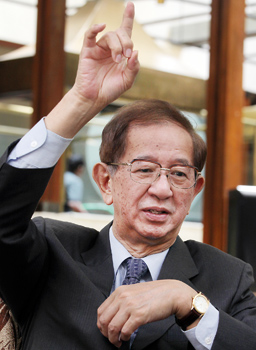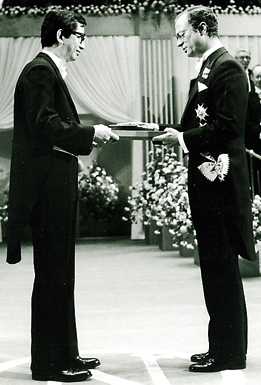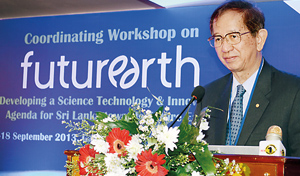Reaching the top with nature as his teacher
Not for him were the simple privileges of textbooks, the routine of the classroom or even visits to a well-stocked library. For him, there were only the jungle-clad mountains and life in the wild amidst nature, “running around”. His ‘teacher’ took on different forms. The changing of the seasons, pollination, the full bloom of flowers and the trees heavy with fruit.

Prof. Lee: Attempting to make the world a better place. Pic by M.A. Pushpa Kumara
There was also the ‘other teacher’, the war, which brought the drone of the planes overhead and the blasts of bombs as they exploded close-by. All these were part of the experiences of a boy of just seven or eight, who always kept questioning…….Why?
This unquenchable curiosity, this yearning to unravel the happenings around him, to get to the bottom of what he saw, would pave the way to the glory of the Nobel Prize in Chemistry.
As the Royal Swedish Academy of Sciences makes ready to announce the Nobel Prize in Chemistry 2013 on October 9 at Stockholm, Sweden, before us in Sri Lanka on Monday (September 16) is Prof. Yuan Tseh Lee from Taiwan, the Chemistry Laureate of 1986.
Humility seems to be the hallmark of Prof. Lee who along with Dudley R. Herschbach and John C. Polanyi was jointly awarded the Nobel Prize in Chemistry in 1986 “for their contributions concerning the dynamics of chemical elementary processes”.
It is in answer to how he achieved this feat that Prof. Lee takes us back in time to Taiwan, troubled times for the country under Japanese occupation. Recalling that in First Grade he had to learn Japanese as the first language, his eyes take on a far-away look as he relives his childhood.
Taiwan, like many across the globe was caught up in World War II (1939-45) and the Lee family had fled to the mountains from Hsinchu city over 80km from Taipei. Life had been comfortable, his father being an accomplished artist and his mother a schoolteacher, when the war intervened.
The air raids by the Allies came daily, for Taiwan was under Japanese occupation after an 1894 war between China and Japan, and like many other townspeople they had to adjust to life in the hills. “There were no formal lessons,” says Prof. Lee, describing how “nature became my teacher” and those became “the happiest times in my life”.
There was no electricity but life was “rich”. The river yielded fish and the earth their other food needs but the hills came alive for this boy whose mind was an open book. The bombings brought with them, a different set of questions to which he sought answers, the scientist in him coming to the fore though at that time he was oblivious of it.
What is the “most dangerous moment” he and the other children would speculate. Was it the moment the plane was right overhead or just behind or just ahead that the bomb would fall on them? For they had to time their moves, to run out and collect the tin foil that the Allies scattered from the planes to prevent being detected by Japanese radar.
When the plane was just behind you, not right overhead was the most dangerous moment, he says wryly. By the time the family came back to the city, everything had changed. There was democracy in many countries, nations such as India were clamouring for Independence, the Palestinian people had been kicked out of their homeland and Israel had come into being, he said.

1986: Prof. Lee being awarded the medal at the Nobel ceremony in Stockholm
With the social revolution and the need for equality among all keeping him restive and pondering over what was going on in the world, Prof. Lee was also grappling with what an idealistic society should be. Caught up in changing times, he concedes that he became very mature. With the Taiwanese government of that time being not only repressive but also corrupt, idealistic Prof. Lee would tell his mother that the country should be run by youth and not selfish old men.
It was a full life for him in High School. He was a very good student with high test scores, sportsman playing tennis, ping-pong and baseball and musician not only playing the trombone but also singing in the choir. The world was at his feet. Then illness struck. Soon after a tennis tournament, he came home exhausted and critically ill, to be told by doctors that he needed to stay home for a month. “My classmates were going to school and I was left behind. What is the meaning of life,” Prof. Lee who was about 15 years old at the time kept wracking his brains.
The “awakening” as he calls it came then. He wanted to get out of his enforced captivity. “I wanted to become my own master,” he smiles. Stopping all his extra-curricular activities, his single-minded purpose in life fell into place. By that time, another role-model fascinated him. It was the discoverer of radium and polonium and also the Nobel Prize winner in Chemistry 1911, French-Polish Marie Curie.
A voracious reader not only of science books but also anything which came his way such as economics, sociology and social transformation, the biography of Marie Curie by her daughter kept him transfixed. It was not only her monumental achievements in science that impressed him but also her idealism and her unorthodox way of fixing things for the betterment of mankind. How she drove an ambulance and went to the aid of wounded soldiers during World War I (1914-18), touched him deeply and he says simply, “Her character excited me, she was a wonderful human being.”
Thomas Alva Edison (of light bulb fame) patented his discoveries but Marie Curie (with her pioneering research on radioactivity) was of a bigger vision and did not apply for patents, points out Prof. Lee, adding humbly that he realized the exciting potential of science and that was the way for him.
Prof. Lee wanted no fame, he wanted to enter university, become a scientist, help people and make the world a better place.
Admitted to the National Taiwan University in 1955 without having to take the entrance examination but on his excellent academic performance in High School, by the end of his freshman year he had decided on chemistry as his chosen field. With a thesis on the separation of Strontium and Barium using the paper electrophoresis method, he graduated in 1959.
There was no turning back – National Tsinghua University for graduate work and later the University of California, Berkeley in the United States of America where he received his Ph.D. Staying on at Berkeley, he learned the art of designing and constructing a very powerful scattering apparatus in connection with ion molecule reactive scattering experiments. Next was Harvard University as a post-doctoral student, spending half his time working on the reactions of hydrogen atoms and diatomic alkali molecules and the other half on the construction of a universal crossed molecular beams apparatus.
Later he began his illustrious academic career at the James Franck Institute of the University of Chicago becoming a “creative scientist”. Exciting and pioneering experiments with his students followed with his construction of a new generation state-of-the-art crossed molecular beams apparatus. In 1974, he returned to Berkeley as Professor of Chemistry and Principal Investigator at the Lawrence Berkeley Laboratory, where many very sophisticated molecular beams apparati were specially designed to pursue problems associated with reaction dynamics, photochemical processes and molecular spectroscopy.
Although numerous have been the laurels, the jewel in the crown, of course, was the Nobel Prize in 1986. The ceremony at which he was awarded his medal and prize money was “dignified”, he says. Nearly 30 years after, the medal is in a cabinet in his son’s home in America and shown only if anyone insists on having a look. The prize money, he gave his wife Bernice Wu, says Prof. Lee, adding smilingly that although his work is “global business”, money and house-keeping were his wife’s domain.
After the Nobel Prize, life went on and he continued his research in chemical dynamics. To the uninitiated, Prof. Lee gently explains that what secured the Nobel Prize was an apparatus which he and his colleagues designed to follow the trajectory of molecules to understand how chemical reactions take place.
It was a first and the world recognized that, he says, citing the example of a candle burning, the process of which is oxidation of hydrocarbons. This releases Carbon Dioxide (CO2) and water vapour (H2O), along with light and heat. But the naked eye cannot see the complex process. We designed an apparatus to observe the process, which transformed reactants to products.
After more than three decades of research and teaching in America, Prof. Lee returned home to Taiwan in 1994 to serve as President of the reputed research institution in the country, Academia Sinica, originally founded on the Chinese mainland in 1928. While striving to improve the quality of research, he also promoted scientific and cultural development in the land of his birth. He was heavily involved in educational reform and community empowerment in Taiwan.
He also chaired a nonpartisan group from 2000-02 that gave advice on matters concerning cross-strait relations (between Taiwan and China) to former President Chen Shui-bian, whose electoral victory in 2000 marked the first change in the ruling party since World War II.
Although he retired from Academia Sinica in 2006, Prof. Lee now 77 is not ready just yet to relinquish his “duty” as a scientist, though his eyes twinkle when he speaks of his smart six-year-old grand-daughter back in America who is already immersed in the intricacies of the Harry Potter series of books.
Prof. Lee will remain a committed spokesperson for science, education and development of society, with the dream of making society a better place.
Asia must find its own answers: Prof Lee

Prof. Lee delivering the keynote address. Pic by Hasitha Kulasekera
The vital importance of a country investing in science and technology, was reiterated by Nobel Laureate in Chemistry, Prof. Lee, who was in Sri Lanka as President of the International Council for Science (ICSU). A good education and enough money for young people to do scientific research are the way forward for Sri Lanka, he said urging the allocation of adequate funds. Prof. Lee has been successful in persuading the government in Taiwan to give prominence to science and technology and now 2-3% of the GDP is channelled towards this. (Incidentally, Sri Lanka earmarks only less than 0.2% of its GDP.)
Here to take part in a Workshop on FutureEarth to develop a Science Technology & Innovation Agenda for Sri Lanka, Prof. Lee told the Sunday Times that the pathways to global sustainability are global responses to global problems. “Back to nature and back to sunshine,” is the answer.
Live better, for less, rationalizes this scientist, pointing out that from “unlimited” earth we are now in a “limited” earth. Exploding production and consumption and exploding human population have created an exploding human footprint.
Human survival is facing a crisis – biodiversity loss, ecosystem decline and weather extremes. The need of the hour is population control, manufacturing control and consumption control. Asia must find its own answers and not follow the west, cautioned Prof. Lee. Arguing that if an American is asked what his “need” is, he would reply that it is an automobile, Prof. Lee says and African’s response would be food, which is a basic necessity. This is why we need to find our own path.
The inauguration of the two-day Coordinating Workshop on FutureEarth was held on Tuesday (September 17) at the Galadari Hotel with Senior Minister for Scientific Affairs, Prof. Tissa Vitharane attending.
While Prof. Lee delivered the keynote address on ‘Sustainable Transformation of Human Society’, the distinguished speakers included Prof. Heinz Gutscher of the University of Zurich, Switzerland, and Prof. Nordin Hasan, Director of ICSU ROAP from Malaysia. The workshop was organised by the Coordinating Secretariat for Science Technology and Innovation (COSTI) which is headed by Prof. Sirimali Fernando.
comments powered by Disqus

